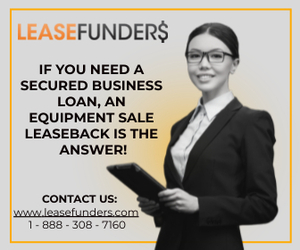What Is a Sale-Leaseback, and How Does It Work?
Body
A sale-leaseback is a unique type of equipment financing. In a sale-leaseback, sometimes called a sale-and-leaseback, you can sell a property you have to a leasing business or loan provider and then lease it back from them. This is how sale-leasebacks typically work in business realty, where businesses often use them to free up capital that's tied up a property investment.
In real estate sale-leasebacks, the financing partner normally creates a triple net lease (which is a lease that needs the lessee to pay property expenses) for the businesses that just sold the property. The financing partner becomes the proprietor and collects rental payments from the previous property owner, who is now the occupant.
However, equipment leaseback is more versatile. In an equipment sale leaseback, you can pledge the property as collateral and borrow the funds via a $1 acquisition lease or equipment finance agreement. Depending on the type of transaction that fits your needs, the resulting lease could be an operating lease or a capital lease.
Although property companies often use sale-leasebacks, business owners in many other sectors may not know about this financing option. Nonetheless, you can do a sale-leaseback transaction with all types of properties, including business equipment like construction equipment, farm equipment, manufacturing and storage assets, energy solutions, and much more.
How Do Equipment Sale-Leasebacks Work?
There are other ways to structure sale-leaseback deals. If you work with an independent financing partner, they must be able to create an option that's tailored to your business and helps you attain your short-term and long-term goals.
After you sell the equipment to your financing partner, you'll participate in a lease agreement and make payments for a time period (lease term) that you both agree on. Currently, you become to be the lessee and your financing partner becomes the lessor.
Sale-leasebacks normally include fixed lease payments and tend to have longer terms than other types of financing. Whether the sale-leaseback turns up as lending on your company's balance sheet depends upon whether the deal was structured as an operating lease or capital lease.
The major difference between a line of credit (LOC) and a sale-leaseback is that a LOC is normally secured by short-term properties, such as accounts receivable and also inventory, as the rate of interest changes over time. A business will draw on a LOC as needed to sustain existing cash flow needs.
On the other hand, sale leasebacks usually include a fixed term and a fixed rate. So, in a common sale leaseback, your business would receive a lump sum of cash at the closing and then pay it back in monthly installments gradually.
What Types of Equipment Can I Use to Obtain a Sale-Leaseback?
Usually, businesses that make use of sale-leasebacks are companies that have high-cost fixed properties, like property or large and expensive pieces of equipment. That's why businesses in the real estate industry love sale-leaseback financing: the land is the utmost high-cost fixed property. However, sale-leasebacks are also used by companies in all types of other industries, consisting of building and construction, transportation, manufacturing, and agriculture.
When you're trying to choose whether a piece of equipment is a good candidate for a sale-leaseback, think big. Large trucks, valuable items of heavy machinery, and titled rolling stock can all work. However, collections of small things most likely won't do, even if they add up to a large amount. For example, your financing partner most likely won't intend to deal with the headache of assessing and potentially selling piles of used office equipment.
What Are the Restrictions and Requirements for a Sale-Leaseback?
You do need to meet two main conditions to get qualify for a sale-leaseback. Those conditions are:
You need to own the equipment outright. The equipment should be free of liens and should be either totally paid or very close.
The equipment requires to have a resale or auction value. If the equipment does not have any fair market value, then your financing partner won't have a reason to acquire them from you. And Minimum 600 credit score is needed.
Contact Lease Funders To Learn More About Your Business Financing Options
If you have any questions about whether you get approved for equipment sale-leaseback financing or any other type of financing? We're here to help! Call us at 1-888-308-7160.













Comments